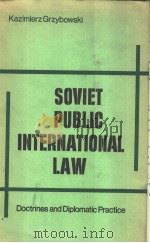《THE INTERNATIONAL LAW OF DIPLOMACY THE DIPLOMATIC INSTRUMENT AND WORLD PUBLIC ORDER》
| 作者 | 编者 |
|---|---|
| 出版 | MARTINUS NIJHOFF PUBLISHERS |
| 参考页数 | 682 |
| 出版时间 | 1989(求助前请核对) 目录预览 |
| ISBN号 | 0792300831 — 求助条款 |
| PDF编号 | 812895178(仅供预览,未存储实际文件) |
| 求助格式 | 扫描PDF(若分多册发行,每次仅能受理1册) |

1.Introduction1
1.1"Diplomacy" as Inter-Elite Communication in the World Arena1
1.2 Diplomacy in Historical Perspective3
1.3 Diplomacy in the World Community Policy Perspective5
1.4 The Major Contexts of the Use of the Diplomatic Instrument7
1.5 The Process of Inter-Elite Communication10
1.6 Inter-Elite Communication and Strategic Bargaining11
1.7 The Game and Bargaining Theories13
1.8 Diplomatic Strategy:Persuasive or Coercive?15
1.9 Sequence of Chapters17
2.The Processes of Diplomacy,Claims and Decisions18
2.1The Analysis of the Process of Diplomacy18
2.1AParticipants18
(i) Officials of States19
(ii) International Officials34
(iii) Non-Officials40
2.1BPerspectives42
(i) Demands(Objectives)43
(ii) Identifications46
(iii) Expectations48
2.1CArenas48
(i) Features of the Arenas49
(ii) Access to the Arenas61
2.1DBase Values:Relative Capabilities at Diplomatic Strategy63
(i) Formal Authority63
(ii) Facilities for Operating Diplomatic Strategies64
(iii) Values Available for Deployment69
2.1EOperations:Techniques and Tactics72
(i) Intelligence and Guidance73
(ii) Preparation75
(iii) Communication with other Elites82
2.1FOutcomes99
(i) Mutual Enlightenment99
(ii) Participation in Public Order Decisions99
(iii) Shaping and Sharing of Values101
2.1GEffects104
2.2 The Process of Claims106
2.3 The Process of Authoritative Decisions114
3.Preferred Basic Community Policies118
3.1Facilitation of the Process and Regulation to Protect It and Other Community Values118
3.2 Participants120
3.3 Objectives123
3.4 Arenas:Establishment and Access125
3.5 Bases of Capability130
3.6 Operations and Tactics131
3.7 Outcome132
3.8 Effects133
3.9 Prescription and Application of Policy133
4.Trends of Decision:Claims Concerning Participation134
4.1Claims for Authority to Participate134
4.1AOfficials of States134
(i) Head of State135
(ii) Head of Government145
(iii) Minister for Foreign Affairs and High Officials of the Ministry146
(iv) Other Ministers and High Officials of those Ministries148
(v) Diplomatic Officials148
(vi) Consular Officials148
(vii) Officials of other Field Missions149
(viii) Military Officials152
(ix) Legislative Officials152
(x) Judicial Officials156
4.1BInternational Officials157
(i) Heads of Secretariats157
(ii) Other High Officials of the Secretariat167
(iii) Members of Commissions and Committees and Special Representatives169
4.1CNon-Officials170
(i) Leaders of Political Parties and Movements171
(ii) Leaders of Pressure Groups174
(iii) Individuals177
4.2Claims for Exclusion from Participation178
4.2ACounter-Elites178
(i) Unrecognized181
(ii) Recognized as Legitimate Aspirants to Power188
(iii) Recognized as Insurgents188
(iv) Recognized as Belligerents191
(v) Recognized as a De Facto Government192
(vi) Recognized as De Jure Government194
4.2B Governments in Exile195
4.3Claims Concerning the Modes of Establishing Authorization to Participate201
4.3AOfficials of States201
(i) Credentials202
(ii) Full Powers206
(iii) Other Modes:Past Practice217
4.3B International Officials217
5.Claims Concerning Objectives221
5.1Coercion221
5.1A Major Coercion221
5.1B Minor Coercion231
5.2 Other International Crimes as Objectives232
5.3 Agreements Contrary to Jus Cogens233
5.4 Conclusion of a Treaty Conflicting with a Prior Treaty235
6.Claims Concerning Arenas242
6.1Different Types of Arenas:Establishment and Access242
6.1AThe Classical Diplomatic Arena242
(i) Diplomatic Relations and Diplomatic Missions242
(ii) Special or Ad Hoc Missions262
(iii) Other Field Missions266
(iv) Consulates268
(v) Permanent Missions to International Organizations273
(vi) Observer Missions281
(vii) Liaison of an International Organization with Another284
(viii) Field Missions of International Organizations286
(ix) International Conferences and Organs of the Classical Diplomatic Type289
6.1B The Parliamentary-Diplomatic Arena291
6.1C The Parliamentary Arena292
6.1D The Adjudicative Arena303
6.1E The Executive Arena313
6.2The Spatial Features of the Arena as Bases of Preference315
(i) General versus Regional or Plural317
(ii) Multilateral versus Bilateral328
6.3 Continuity of the Arena as a Basis for Preference329
6.4 Crisis Situations and Appropriate Arenas330
7.Claims to Formal Bases of Capability333
7.1The Head of State,of Government,and Minister for Foreign Affairs333
7.2Diplomatic Missions and the Personnel of the Missions335
7.2A The General Policy Bases of Diplomatic Immunities and Privileges336
7.2BNon-Subjection to the Authority and Control of the Receiving state346
(i) Immunity of the Head of the Mission from Jurisdiction346
(ii) Inviolability of the Head of the Mission366
(iii) Inviolability of the Premises of the Diplomatic Mission372
(iv) Inviolability of the Archives of the Diplomatic Mission380
(v) Inviolability of Communication384
(vi) Respect and Deference390
7.2CFacilities for the Functioning of the Mission392
(i) The Premises of the Mission392
(ii) The Staff of the Mission399
(iii) Protection of the Staff of the Mission404
(iv) Protection of the Families of the Members of the Mission407
(v) Protection of the Servants of the Members of the Mission408
(vi) Freedom of Movement for the Members of the Mission409
(vii) Duration of the Immunities and Privileges411
7.2DClaims of the Receiving Government Against the Diplomatic Mission413
(i) Non-interference in the Internal Affairs of the Receiving State413
(ii) Observance of Local Laws and Regulations415
(iii) Respect and Deference416
(iv) Proper use of the Premises of the Mission and Facilities416
(v) Pursuits for Private Profit417
(vi) Profession of Ideologies and Dissemination of Propaganda418
(vii) Waiver of Privileges and Immunities422
7.2EClaims Against Third States424
(i) Free Passage424
(ii) Communication426
7.3Consular Posts and Their Members427
7.3A Theoretical Basis of Immunities and Privileges428
7.3B Privileges and Immunities of Consular Officials Entrusted with Diplomatic Functions432
7.3CConsular Immunities and Privileges:Non-Subjection to the Authority and Control of the Receiving State433
(i) Immunity of the Head of the Consular Post from the Jurisdiction of the Receiving State433
(ii) Inviolability of the Head of the Consular Post439
(iii) Inviolability of the Premises of the Consular Post440
(iv) Inviolability of Archives442
(v) Freedom and Inviolability of Communication442
(vi) Respect and Deference442
7.3DFacilities for the Functioning of the Consular Post443
(i) Premises443
(ii) The Staff of the Consular Post445
(iii) Protection of the Staff of the Post446
7.3E Claims of the Receiving State449
7.3F Claims Against Third States450
7.3G Honorary Consular Officers451
7.3H Consular Agencies451
7.4 Field Missions451
7.5Special Missions454
7.5A Theoretical Basis454
7.5B Customary Law Relating to Immunities and Privileges of Special Missions455
7.5CThe Convention on Special Missions456
(i) Claims of the Sending State456
(ii) Claims of the Receiving State461
(iii) Claims against Third States461
7.6Officials of International Organizations462
7.6A Policy Bases462
7.6B The Chief Executive of the Organization464
7.6C Inviolability of the Premises466
7.6D Inviolability of the Archives467
7.6E Inviolability of Communication468
7.6F Fiscal Exemptions of the Organization469
7.6G The Staff of the Organization469
7.6H Claims of the Host State472
7.7 Experts Sent on the Missions of International Organizations475
7.8 Field Missions of International Organizations476
7.9 Liaison Offices of International Organizations477
7.10 Permanent Missions to International Organizations478
7.11 Observer Missions487
7.12Delegates to International Conferences and Meetings of Organs of International Organizations489
7.12A International Conferences Convened by Governments489
7.12BMeetings of Organs of International Organizations490
(i) Representatives of Members490
(ii) Representatives of Non-Member States492
(iii) Representatives of Inter-Governmental Organizations493
(iv) Representatives of Non-Governmental Organizations and of the Press and other Mass Media493
7.12C Conferences Convened by International Organizations494
7.12D The Convention on the Representation of States in Their Relations with International Organizations of a Universal Character(CRSRIO) and Delegations495
7.13 General Appraisal498
8.Operations and Tactics500
8.1Indirect Interference with the Gathering and Transmission of Intelligence500
8.1A Preventing Local Officials and Non-Officials from Contacting the Officials of the Diplomatic Mission or Other Similar Agency500
8.IB Incitement of Local Population Against the Members of the Mission502
8.1C Accusations of Espionage503
8.1D Jamming Electronic Surveillance Equipment505
8.2Operations in the Classical Diplomatic Arena506
8.2AInitiation and Maintenance of Communication Exchange506
(i) Refusal to Receive Communications507
(ii) Refusal to Consult on Issues508
(iii) Refusal to Negotiate509
(iv) Claim that it is not Permissible to Discontinue the Negotiations that are Initiated512
8.2BImpermissible Tactics514
(i) Impermissible Coercive Tactics514
(ii) Falsehood and Deceit522
8.3Parliamentary-Diplomatic and Parliamentary Arenas:Regulation of Operations and Tactics522
8.3A Adoption of Rules of Procedure524
8.3B Appointment of the Presiding Officer529
8.3C Adoption of the Agenda530
8.3D Discussion in the Plenary and in the Committees533
8.3E Priority Among the Different Items for Discussion534
8.3F Priority Concerning Participation in the Debate535
8.3G Priority Concerning Different Types of Motions537
8.3H Claim for Reconsideration of Decisions540
8.3I Equal Voting and Weighted Voting541
8.3J Developing Consensus Before,or Instead of,Voting544
8.4Operations in the Adjudicative Arena549
8.4A Claim that the Tactics Adopted Should not be Contrary to the Principle of Good Faith549
8.4B Claim that Tactics Involving Partiality Are Impermissible551
8.4C Claim that Coercive Tactics Are Impremissible553
9.Outcomes555
9.1Introduction and Clarification of Policy555
9.2Claim that the Outcome of the Diplomatic Communication Has Been a Prescription558
9.2ACommunications in the Classical Diplomatic Arena558
(i) Agreements558
(ii) Customary Prescriptions577
(iii) Expectations Created by Abstentions from Communicating and Unilateral Declarations595
9.2BCommunications in the Parliamentary-Diplomatic and Parliamentary Arenas607
(i) Collective Acts of Participants607
(ii) Unilateral Declarations623
9.2C Communications in the Adjudicative Arena625
9.2D Communications in the Executive Arena625
9.3Claims Concerning the Content of the Prescription625
9.3AFormal Texts-Claims Concerning Interpretation626
(i) Claim that Interpretation should(need not) be According to Certain Rules628
(ii) Claim that Interpretation should be of the Text Only631
(iii) Claim that the Text should be Interpreted Only by a Reference to the Context636
(iv) Claims for Supplementation of the Agreement and Filling Gaps645
(v) Claim for Integration and "Policing"646
(vi) Claim that the Text in a Particular Language should Guide Interpretation,the Text Being Plurilingual648
(vii) Appraisal652
9.3B When there is no Formal Text653
1989《THE INTERNATIONAL LAW OF DIPLOMACY THE DIPLOMATIC INSTRUMENT AND WORLD PUBLIC ORDER》由于是年代较久的资料都绝版了,几乎不可能购买到实物。如果大家为了学习确实需要,可向博主求助其电子版PDF文件(由 1989 MARTINUS NIJHOFF PUBLISHERS 出版的版本) 。对合法合规的求助,我会当即受理并将下载地址发送给你。
高度相关资料
-
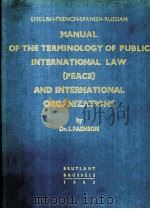
- MANUAL OF THE TERMINOLOGY OF PUBLIC INTERNATIONAL LAW (PEACE) AND INTERNATIONAL ORGANIZTIONS
- 1983 BRYLANT BRUSSELS
-
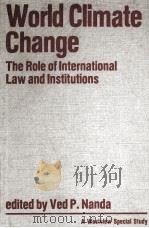
- WORLD CLIMATE CHANGE THE ROLE OF INTERNATIONAL LAW AND INSTITUTIONS
- 1983 WESTVIEW PRESS
-

- THE CLASH OF CIVILIZATIONS AND THE REMAKING OF WORLD ORDER
- 1996 A TOUCHSTONE BOOK
-

- THE INTERNATIONAL LAW OF PROPAGANDA The Ideological Instrument and World Public Order
- 1989 NEW HAVEN PRESS
-

- INTERNATIONAL LAW AND ORDER
- 1971 STEVENS & SONS
-
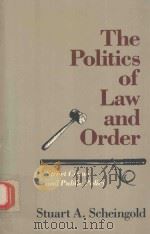
- The Politics of Law and Order
- 1984 Longman
-

- THE ESSENTIALS OF INTERNATIONAL PUBLIC LAW AND ORGANIZATION
- 1929 THE MACMILLAN COMPANY
-
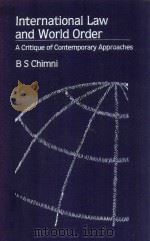
- International Law and World Order Critique of Contemporary Approaches
- 1993 Sage Publications
-
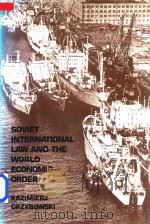
- Soviet International Law and the World Economic Order
- 1987 Duke University Press
-
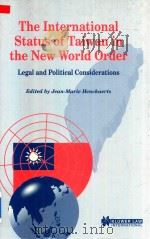
- The International Status of Taiwan in the New World Order Legal and Political Considerations
- 1996 Kluwer Law International
-
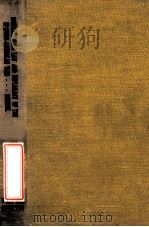
- INTERNATIONAL LAW AND DIPLOMACY OF THE SPANISH-AMERICAN WAR
- 1968 THE JOHNS HOPKINS PRESS
-
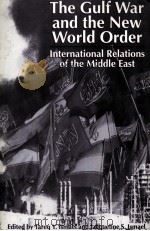
- THE GULF WAR AND THE NEW WORLD ORDER INTERNATIONAL RELATIONS OF THE MIDDLE EAST
- 1994 UNIVERSITY PRESS OF FLORIDA
-
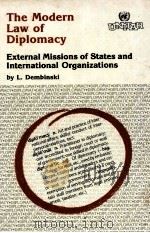
- THE MODERN LAW OF DIPLOMACY
- 1988 MARTINUS NIJHOFF PUBLISHERS
提示:百度云已更名为百度网盘(百度盘),天翼云盘、微盘下载地址……暂未提供。➥ PDF文字可复制化或转WORD
